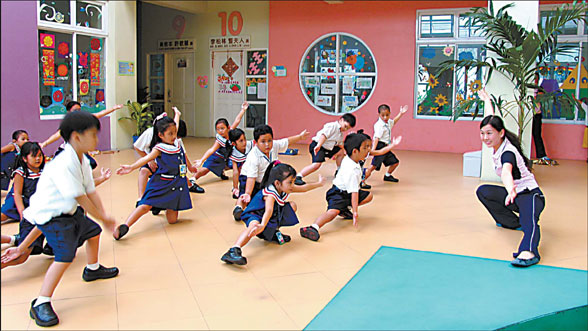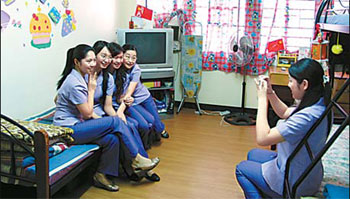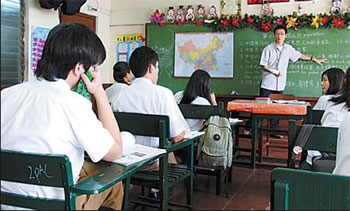Life lessons
|
A volunteer Mandarin teacher teaches children kungfu in Bacolod Tay Tung High School in the Philippines. |
Chinese teacher Weng Qin opens a heavy iron gate outside her dormitory at 7 am and goes downstairs to work. The Fujian native has lived in Manila's Paco Citizen Academy (PCA) for nearly two years, since she volunteered to work in the Philippines.
Her life is simple: In the day she teaches local students aged from 2 to 13; at night she just stays home, watching TV or surfing the Internet.
"What I am afraid of the most while living here is not the hardships; it is about how to spend festivals or holidays, because I can't help but miss home," the 21-year-old says.
"This is why I always keep myself busy. There is nothing better than working to get over homesickness."
The Philippines is the first country in which the Office of Chinese Language Council International (Hanban) has sent volunteers to teach Mandarin since 2003.
|
Chen Weihong takes a picture of other volunteer teachers from China in their dormitory. |
"Sending volunteers abroad has far-reaching significance. We hope more people will understand Chinese culture," Hanban deputy director-general Wang Yongli says.
Wang points out that this year is the 30th anniversary of China's economic reforms. The country's achievements since have captivated world attention and generated controversy.
"We want to deliver a message through language education that we only generate opportunities for people around the world, rather than challenge them," Wang says.
About 480 Chinese teachers have volunteered to date. Over the past five years, the number has been rapidly rising, with 176 signing up in 2007 - a significant increase from 17 in the first year.
Because more than 90 percent of the 1.2 million Chinese-Filipinos can trace their ancestry to Fujian province, all volunteer teachers sent to the country are selected from Fujian. Most teachers are women aged between 20 and 25.
For fresh graduates without much teaching experience, learning how to manage a class is the first challenge they must face.
Lin Zhenzhen felt frustrated at the beginning. The teacher at the Philippine Institute of Quezon City (PIQC) could barely hide her nervousness when she first stood in front of the class, noticing that many students were taller than her.
No matter how hard the 21-year-old tried, the students acted as if she didn't exist. The desperate teacher asked the students to write comments about the class in English. There were many surprising answers.

One student wrote: "We don't like your class - not because you are a bad teacher but because we know little about Mandarin, and cannot understand what you say. But we do like you, don't give up please."
The warm words boosted her confidence. Since then, more courses have been arranged in audio-visual classrooms, making it easier for students to understand. Lin also asked her students to teach her Filipino and guitar after class.
According to PIQC director Lee Shu Hwei, it takes no more than three months for Chinese volunteers to adapt to a new class. However, the real challenge for them is keeping students enthusiastic.
"Filipino students lack motivation for Mandarin studies, because no language exams are set for them," says the woman from Taiwan. "Besides, it is not a must-have asset for them to make a living after they graduate. Many of them are forced to study by their parents, so they act rebelliously in the class."
Lee stresses the importance of updating the teaching methods and adopting more interesting teaching materials.
Weng Qin has developed an innovation at PCA's kindergarten. She and another volunteer divided a classroom into several areas for reading, mathematics and playing.
Because many locals love dancing, Weng turned morning exercises into dance sessions with a mix of popular Filipino and Chinese children's songs. Weng has invented instruments created from used water bottles. Children can rhythmically shake the bottles while dancing.
Manila Patriotic School was one of the first schools to introduce Chinese volunteers in 2003.
"The inclusion of Chinese volunteers in the teaching team has helped improve its professionalism and make the vibe more youthful than ever before," director Chen Jincan says.
He explains that many Chinese-language schools, especially those outside the downtown Manila, are short of qualified young teachers. Fewer local university graduates have shown interest in teaching, while those already in the field are aging.
PCA principal Peter Lim agrees.
"(The Chinese volunteers) have been well trained and equipped with an advanced knowledge of Chinese as well as the usage of computers; this is definitely something our teachers cannot compete with," he says.
However, he points out that many Chinese volunteers require a local teacher in the classroom because of language barriers.
Chinese volunteers usually complete a one-year term in the Philippines, and if they so choose, they can extend their stays for an additional year.
|
Yu He, a volunteer Mandarin teacher at a Chinese class in Manila Patriotic School. Photos by Xie Fang |
But Li Yi can't wait to go home. The Fujian native started working in PIQC last May. As the only child in her family, the 23-year-old didn't know how to cook before she went abroad. She is planning to treat her mother with a big dinner after she returns.
"What I have gained over the past 10 months is learning how to be independent and learning how to get on well with people from different cultural backgrounds," she says, standing clad in the purple uniform of the school's staff. "I feel proud of being a volunteer to work in the Philippines."
Li's colleague Chen Weihong is concerned about job-hunting in the increasingly competitive market back home.
"I am worried, because we have missed many recruitment events," she says, frowning. "We have gained overseas working experience that some people don't have, but they have grabbed good working opportunities that we don't have. China is such a rapidly developing country, that I'm afraid of having dropped out after spending a year here."
On the other hand, the principals of Philippine-Chinese schools wish to extend volunteers' service to more than two years. Some argue that just one year is too short a period for volunteers to stay, because they have just become acclimated to the new environment. And having them leave so soon is certainly not good for students, they say.
(China Daily 02/26/2008 page18)

















